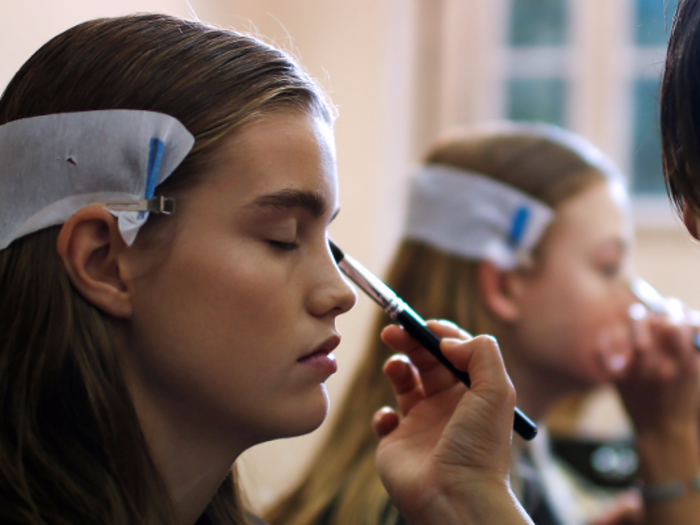9 tricks to instantly appear more competent
Tell a joke — but only if you're sure it's appropriate for your audience

Don't send professional emails with smiling emoticons
Really, just don't. :)
That's according to a 2017 study published in the journal Social Psychological and Personality Science.
Researchers conducted multiple experiments with a total of more than 500 participants in 29 countries and learned that hypothetical employees who included smiling emoticons in professional emails were perceived as less competent than those who sent the same emails without the smiley face.
The researchers learned that the decrease in competence had to do with the fact that participants saw the smiling emoticons as inappropriate in formal contexts.
Make your face look slightly wider

Research from New York University and the University of Connecticut, published in 2015 in the journal Personality and Social Psychology Bulletin, suggests that it's not so easy to make yourself look more competent.
That's because perceptions of competence — at least when it comes to physical ability — depend largely on your facial structure.
In the study, participants looked at male faces whose proportions had been digitally altered, so that some looked wider than others. They were asked to choose which man they thought would win a weightlifting competition. (Presumably, they were choosing based on physical ability, or competence.)
Sure enough, men with wider faces were considered more likely to win the weightlifting competition.
While you can't physically alter your facial structure (without getting cosmetic surgery), you can probably work a little Photoshop magic to make your face look slightly wider than it really is — or just face the camera directly instead of at an angle.
Post a profile photo taken from a distance

If you're choosing a Facebook or LinkedIn pic, consider selecting one where you're standing a few feet from the camera. That's according to 2012 research published in the journal PLOS ONE.
In multiple experiments with hundreds of participants, researchers found that a group of 18 white men were repeatedly considered more competent, trustworthy, and attractive when they were photographed from about 4.5 feet away, as opposed to about 1.5 feet away.
Act a little cold

We tend to judge people on two main traits when we first meet them: warmth and competence. But is it possible to be rated highly on both?
A 2009 study, published in the journal Experimental Social Psychology and led by Belgian and American psychologists, suggests that groups of people who are warmer are also judged as less competent.
About 80 undergrads at an American university read descriptions of two different groups. Each group fell into one of four categories: high on competence and high on warmth; high on competence and low on warmth; low on competence and high on warmth; or low on competence and low on warmth.
The participants weren't told that the groups were competent or warm — instead they received descriptions of each group that implied these traits.
Participants were then asked to rate each group on a number of traits. Results showed that high-competence groups were seen as more competent if they were also low on warmth.
... but maybe not if you're a man in a leadership position

While soliciting advice can generally help you look more competent, a 2015 study, published in The Leadership Quarterly, found that asking for help might make male leaders in particular seem less competent.
Researchers recruited 65 business students to answer questions about their experiences in “leadership ventures,” in which they participated in challenges like mountaineering in Antarctica and climbing a volcano in Ecuador. Students took turns acting as the “leader of the day.”
The researchers asked students to reflect on the behavior of the leader of the day: Some students answered questions about how often the leader sought help, while others answered questions about how competent that same leader seemed.
As it turns out, male leaders who reportedly asked for help a lot were rated less competent than male leaders who asked less often.
Ask for advice ...

You might fear that asking for help will make you look stupid.
2015 research from Harvard Business School, published in the journal Management Science, suggests that asking for advice can instead make you seem more competent.
In one experiment, 170 university students worked on a series of computer tasks and were told they'd be matched with a partner who would complete the same tasks. (The partner was really a computer simulation.) When they'd finished the tasks, the "partner" either said, "I hope it went well" or "I hope it went well. Do you have any advice?"
As it turns out, students who'd been asked for advice rated their "partner" more competent than those who hadn't been asked for advice.
The researchers explain that when you ask for advice, you're validating the person's intelligence and experience, so they feel good about you in turn.
If you’re a woman, consider wearing makeup

In 2011, Nancy Etcoff at Harvard University led a study in which more than 250 adults looked at photographs of 25 women with different types of makeup.
One-quarter of them wore no makeup; one quarter were made to look "natural" (some makeup); one quarter were made to look "professional" (a bit more makeup than the "natural" group); and one quarter were made look "glamorous" (the most makeup).
As it turns out, judges rated the "glamorous" women the most competent and the barefaced women the least competent.
Speak quickly

If you've got something to say, say it fast.
In one 1975 study, published in the journal Language and Speech, Brigham Young University researchers had 28 university students listen to recordings of six people whose voices had been manipulated to sound slower or faster than normal.
The student volunteers rated the speakers most competent when their voices had been sped up and least competent when their voices had been slowed down.
More recent research suggests that speaking quickly is also a sneaky way to win an argument — at least in the US. One 1991 study published in the journal Personality and Social Psychology Bulletin suggests that's because people will have less time to think critically about your position.
Popular Right Now
Advertisement